mirror of
https://github.com/chefyuan/algorithm-base.git
synced 2024-12-01 08:18:55 +00:00
324 lines
11 KiB
Java
324 lines
11 KiB
Java
> 如果阅读时,发现错误,或者动画不可以显示的问题可以添加我微信好友 **[tan45du_one](https://raw.githubusercontent.com/tan45du/tan45du.github.io/master/个人微信.15egrcgqd94w.jpg)** ,备注 github + 题目 + 问题 向我反馈
|
||
>
|
||
> 感谢支持,该仓库会一直维护,希望对各位有一丢丢帮助。
|
||
>
|
||
> 另外希望手机阅读的同学可以来我的 <u>[**公众号:袁厨的算法小屋**](https://raw.githubusercontent.com/tan45du/test/master/微信图片_20210320152235.2pthdebvh1c0.png)</u> 两个平台同步,想要和题友一起刷题,互相监督的同学,可以在我的小屋点击<u>[**刷题小队**](https://raw.githubusercontent.com/tan45du/test/master/微信图片_20210320152235.2pthdebvh1c0.png)</u>进入。
|
||
|
||
#### [142. 环形链表 II](https://leetcode-cn.com/problems/linked-list-cycle-ii/)
|
||
|
||
题目描述:
|
||
|
||
今天给大家介绍比较有特点的题目,也是一个特别经典的题目,判断链表中有没有环,并返回环的入口。
|
||
|
||
我们可以先做一下这个题目,就是如何判断链表中是否有环呢?下图则为链表存在环的情况。
|
||
|
||
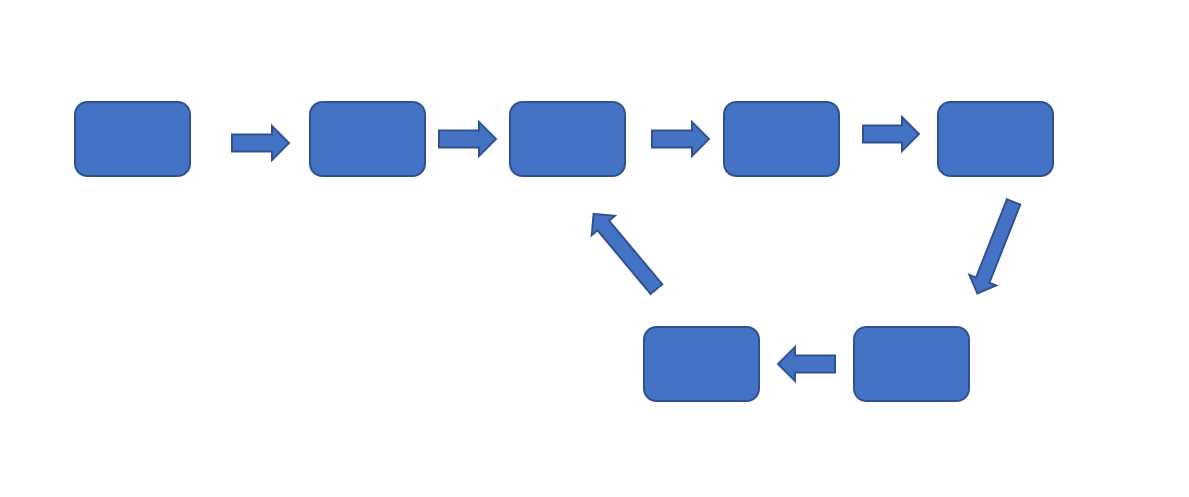
|
||
|
||
判断链表是否有环是很简单的一个问题,我们只需利用之前的快慢指针即可,大家想一下,指针只要进入环内就只能在环中循环,那么我们可以利用快慢指针,虽然慢指针的速度小于快指针但是,总会进入环中,当两个指针都处于环中时,因为移动速度不同,两个指针必会相遇。
|
||
|
||
我们可以这样假设,两个孩子在操场顺时针跑步,一个跑的快,一个跑的慢,跑的快的那个孩子总会追上跑的慢的孩子。
|
||
|
||
代码请参考[【动画模拟】leetcode 141 环形链表](https://github.com/chefyuan/algorithm-base/blob/main/animation-simulation/%E9%93%BE%E8%A1%A8%E7%AF%87/leetcode141%E7%8E%AF%E5%BD%A2%E9%93%BE%E8%A1%A8.md)。
|
||
|
||
判断链表是不是含有环很简单,但是我们想找到环的入口可能就没有那么容易了。(入口则为下图绿色节点)
|
||
|
||
然后我们返回的则为绿色节点的索引,则返回 2。
|
||
|
||
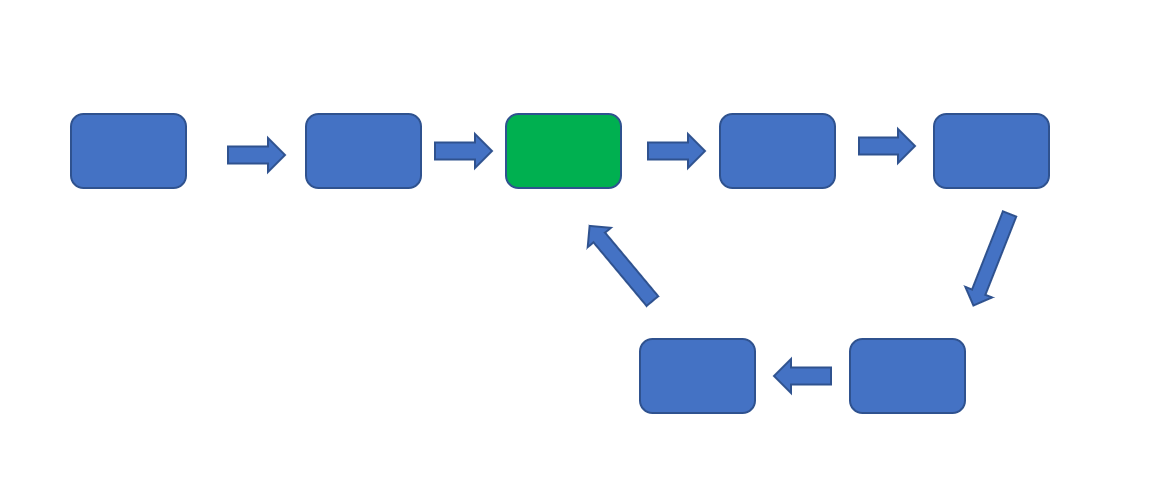
|
||
|
||
### HashSet
|
||
|
||
我们可以利用 HashSet 来做,之前的文章说过 HashSet 是一个不允许有重复元素的集合。所以我们通过 HashSet 来保存链表节点,对链表进行遍历,如果链表不存在环则每个节点都会被存入环中,但是当链表中存在环时,则会发重复存储链表节点的情况,所以当我们发现 HashSet 中含有某节点时说明该节点为环的入口,返回即可。
|
||
|
||
下图中,存储顺序为 0,1,2,3,4,5,6,**2 **因为 2 已经存在,则返回。
|
||
|
||
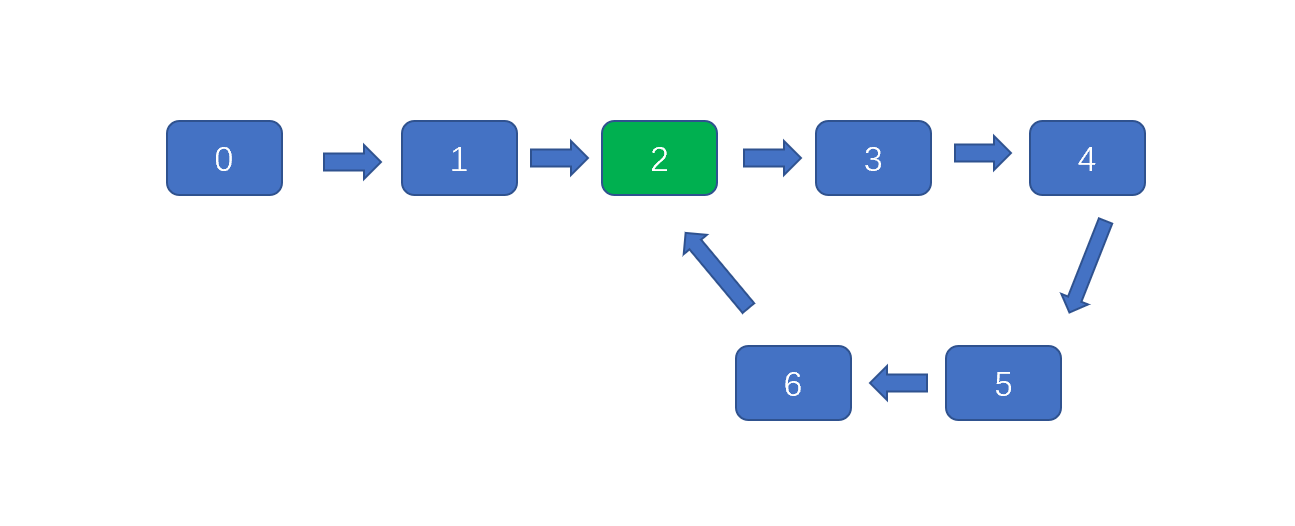
|
||
|
||
Java Code:
|
||
|
||
```java
|
||
public class Solution {
|
||
public ListNode detectCycle(ListNode head) {
|
||
if (head == null) {
|
||
return head;
|
||
}
|
||
if (head.next == null) {
|
||
return head.next;
|
||
}
|
||
//创建新的HashSet,用于保存节点
|
||
HashSet<ListNode> hash = new HashSet<ListNode>();
|
||
//遍历链表
|
||
while (head != null) {
|
||
//判断哈希表中是否含有某节点,没有则保存,含有则返回该节点
|
||
if (hash.contains(head)) {
|
||
return head;
|
||
}
|
||
//不含有,则进行保存,并移动指针
|
||
hash.add(head);
|
||
head = head.next;
|
||
}
|
||
return head;
|
||
}
|
||
}
|
||
```
|
||
|
||
C++ Code:
|
||
|
||
```cpp
|
||
class Solution {
|
||
public:
|
||
ListNode *detectCycle(ListNode *head) {
|
||
if (head == nullptr) return head;
|
||
if (head->next == nullptr) return head->next;
|
||
//创建新的HashSet,用于保存节点
|
||
set<ListNode *> hash;
|
||
//遍历链表
|
||
while (head != nullptr) {
|
||
//判断哈希表中是否含有某节点,没有则保存,含有则返回该节点
|
||
if (hash.count(head)) {
|
||
return head;
|
||
}
|
||
//不含有,则进行保存,并移动指针
|
||
hash.insert(head);
|
||
head = head->next;
|
||
}
|
||
return head;
|
||
}
|
||
};
|
||
```
|
||
|
||
JS Code:
|
||
|
||
```javascript
|
||
var detectCycle = function (head) {
|
||
if (head === null) return head;
|
||
if (head.next === null) return head.next;
|
||
//创建新的HashSet,用于保存节点
|
||
let hash = new Set();
|
||
//遍历链表
|
||
while (head !== null) {
|
||
//判断哈希表中是否含有某节点,没有则保存,含有则返回该节点
|
||
if (hash.has(head)) {
|
||
return head;
|
||
}
|
||
//不含有,则进行保存,并移动指针
|
||
hash.add(head);
|
||
head = head.next;
|
||
}
|
||
return head;
|
||
};
|
||
```
|
||
|
||
Python Code:
|
||
|
||
```python
|
||
class Solution:
|
||
def detectCycle(self, head: ListNode) -> ListNode:
|
||
if head is None:
|
||
return head
|
||
if head.next is None:
|
||
return head.next
|
||
# 创建新的HashSet,用于保存节点
|
||
hash = set()
|
||
while head is not None:
|
||
# 判断哈希表中是否含有某节点,没有则保存,含有则返回该节点
|
||
if head in hash:
|
||
return head
|
||
# 不含有,则进行保存,并移动指针
|
||
hash.add(head)
|
||
head = head.next
|
||
return head
|
||
```
|
||
|
||
### 快慢指针
|
||
|
||
这个方法是比较巧妙的方法,但是不容易想到,也不太容易理解,利用快慢指针判断是否有环很容易,但是判断环的入口就没有那么容易,之前说过快慢指针肯定会在环内相遇,见下图。
|
||
|
||
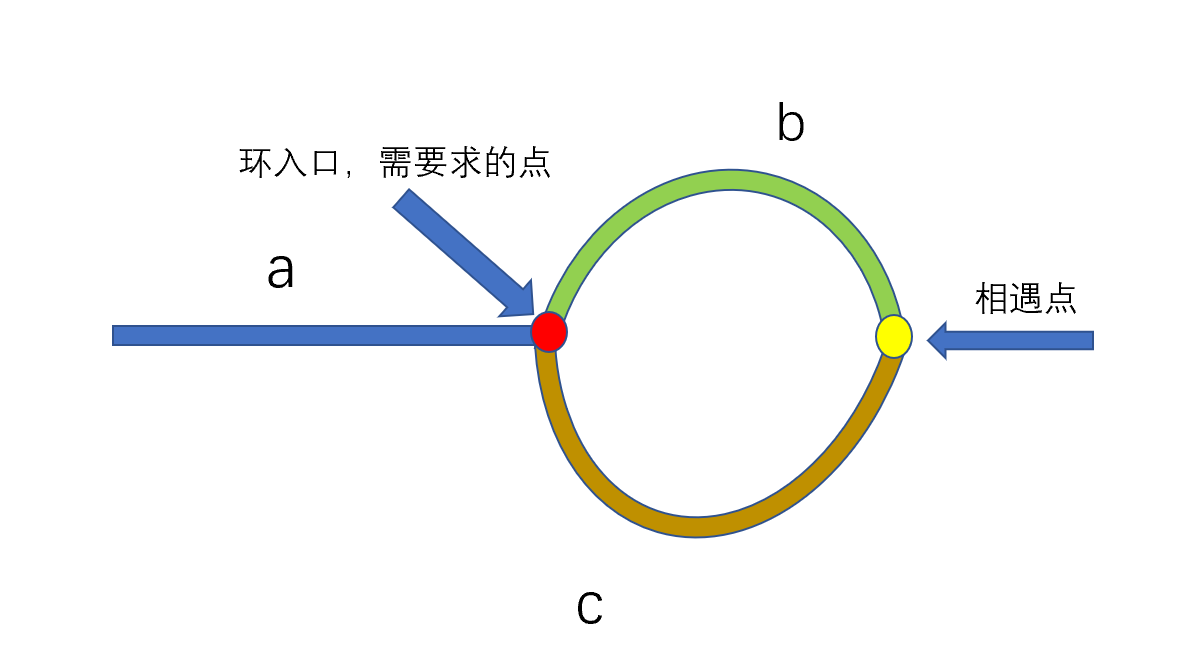
|
||
|
||
上图黄色节点为快慢指针相遇的节点,此时
|
||
|
||
快指针走的距离:**a+(b+c)n+b**,n 代表圈数。
|
||
|
||
很容易理解 b+c 为环的长度,a 为直线距离,b 为绕了 n 圈之后又走了一段距离才相遇,所以相遇时走的总路程为 a+(b+c)n+b,合并同类项得 a+(n+1)b+nc。
|
||
|
||
慢指针走的距离:**a+(b+c)m+b**,m 代表圈数。
|
||
|
||
然后我们设快指针得速度是慢指针的 2 倍,含义为相同时间内,快指针走过的距离是慢指针的 2 倍。
|
||
|
||
**a+(n+1)b+nc=2[a+(m+1)b+mc]**整理得**a+b=(n-2m)(b+c),**那么我们可以从这个等式上面发现什么呢?
|
||
|
||
**b+c**为一圈的长度。也就是说 a+b 等于 n-2m 个环的长度。为了便于理解我们看一种特殊情况,当 n-2m 等于 1,那么 a+b=b+c 整理得,a=c。此时我们只需重新释放两个指针,一个从 head 释放,一个从相遇点释放,速度相同,因为 a=c 所以他俩必会在环入口处相遇,则求得入口节点索引。
|
||
|
||
算法流程:
|
||
|
||
1.设置快慢指针,快指针速度为慢指针的 2 倍。
|
||
|
||
2.找出相遇点。
|
||
|
||
3.在 head 处和相遇点同时释放相同速度且速度为 1 的指针,两指针必会在环入口处相遇。
|
||
|
||
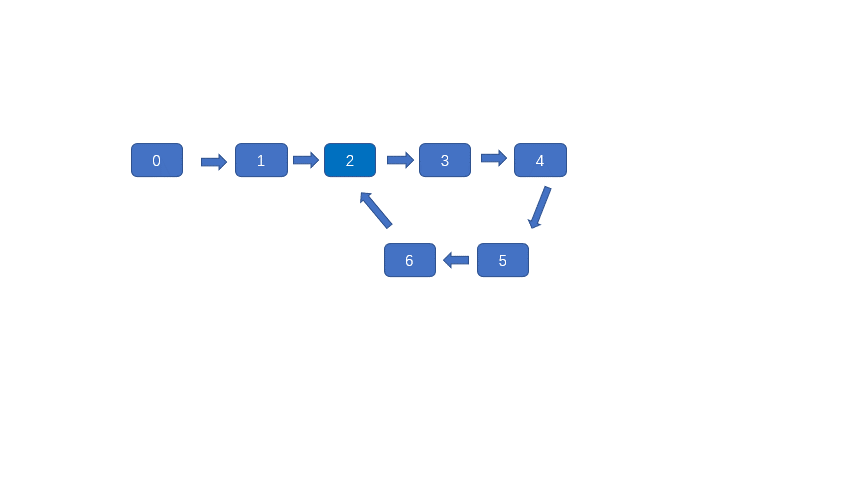
|
||
|
||
**题目代码**
|
||
|
||
Java Code:
|
||
|
||
```java
|
||
public class Solution {
|
||
public ListNode detectCycle(ListNode head) {
|
||
//快慢指针
|
||
ListNode fast = head;
|
||
ListNode slow = head;
|
||
//设置循环条件
|
||
while (fast != null && fast.next != null) {
|
||
fast = fast.next.next;
|
||
slow = slow.next;
|
||
//相遇
|
||
if (fast == slow) {
|
||
//设置一个新的指针,从头节点出发,慢指针速度为1,所以可以使用慢指针从相遇点出发
|
||
ListNode newptr = head;
|
||
while (newptr != slow) {
|
||
slow = slow.next;
|
||
newptr = newptr.next;
|
||
}
|
||
//在环入口相遇
|
||
return slow;
|
||
}
|
||
}
|
||
return null;
|
||
}
|
||
}
|
||
```
|
||
|
||
C++ Code:
|
||
|
||
```cpp
|
||
class Solution {
|
||
public:
|
||
ListNode *detectCycle(ListNode *head) {
|
||
//快慢指针
|
||
ListNode * fast = head;
|
||
ListNode * slow = head;
|
||
//设置循环条件
|
||
while (fast != nullptr && fast->next != nullptr) {
|
||
fast = fast->next->next;
|
||
slow = slow->next;
|
||
//相遇
|
||
if (fast == slow) {
|
||
//设置一个新的指针,从头节点出发,慢指针速度为1,所以可以使用慢指针从相遇点出发
|
||
ListNode * newnode = head;
|
||
while (newnode != slow) {
|
||
slow = slow->next;
|
||
newnode = newnode->next;
|
||
}
|
||
//在环入口相遇
|
||
return slow;
|
||
}
|
||
}
|
||
return nullptr;
|
||
}
|
||
};
|
||
```
|
||
|
||
JS Code:
|
||
|
||
```js
|
||
var detectCycle = function (head) {
|
||
//快慢指针
|
||
let fast = head;
|
||
let slow = head;
|
||
//设置循环条件
|
||
while (fast && fast.next) {
|
||
fast = fast.next.next;
|
||
slow = slow.next;
|
||
//相遇
|
||
if (fast == slow) {
|
||
let newptr = head;
|
||
//设置一个新的指针,从头节点出发,慢指针速度为1,所以可以使用慢指针从相遇点出发
|
||
while (newptr != slow) {
|
||
slow = slow.next;
|
||
newptr = newptr.next;
|
||
}
|
||
//在环入口相遇
|
||
return slow;
|
||
}
|
||
}
|
||
return null;
|
||
};
|
||
```
|
||
|
||
Python Code:
|
||
|
||
```python
|
||
class Solution:
|
||
def detectCycle(self, head: ListNode) -> ListNode:
|
||
# 快慢指针
|
||
fast = head
|
||
slow = head
|
||
# 设置循环条件
|
||
while fast is not None and fast.next is not None:
|
||
fast = fast.next.next
|
||
slow = slow.next
|
||
# 相遇
|
||
if fast is slow:
|
||
# 设置一个新的指针,从头节点出发,慢指针速度为1,所以可以使用慢指针从相遇点出发
|
||
newptr = head
|
||
while newptr is not slow:
|
||
slow = slow.next
|
||
newptr = newptr.next
|
||
# 在环入口相遇
|
||
return slow
|
||
```
|
||
|
||
Swift Code:
|
||
|
||
```swift
|
||
class Solution {
|
||
func detectCycle(_ head: ListNode?) -> ListNode? {
|
||
// 快慢指针
|
||
var fast = head, slow = head
|
||
while fast != nil && fast?.next != nil {
|
||
fast = fast?.next?.next
|
||
slow = slow?.next
|
||
// 相遇
|
||
if fast === slow {
|
||
// 设置一个新的指针,从头节点出发,慢指针速度为1,所以可以使用慢指针从相遇点出发
|
||
// 此处也可以不创新结点,直接将 fast = head
|
||
var newNode = head
|
||
while newNode !== slow {
|
||
slow = slow?.next
|
||
newNode = newNode?.next
|
||
}
|
||
return slow
|
||
}
|
||
}
|
||
return nil
|
||
}
|
||
}
|
||
```
|
||
|
||
Go Code:
|
||
|
||
```go
|
||
func detectCycle(head *ListNode) *ListNode {
|
||
if head == nil { return nil }
|
||
s, f := head, head
|
||
for f != nil && f.Next != nil {
|
||
s = s.Next
|
||
f = f.Next.Next
|
||
// 快慢指针相遇
|
||
if f == s {
|
||
// 快指针从头开始一步一步走,也可以用一个新的指针
|
||
f = head
|
||
for f != s {
|
||
f = f.Next
|
||
s = s.Next
|
||
}
|
||
return f
|
||
}
|
||
}
|
||
return nil
|
||
}
|
||
```
|